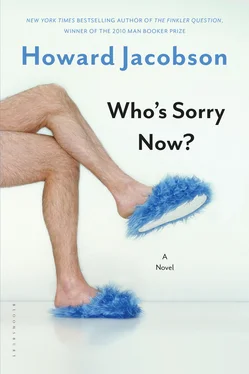But let’s not go overboard. Handsome only if you like bruised summer-berry lips and eyes that appear permanently — and painfully to the person who must look at them — punched out; clever, if you don’t too much mind assertive, though not so assertive as to have done anything worthwhile with his PhD, such as become the Prime Minister he was meant to be, or Chancellor, or even, as many of his contemporaries had become, ball polisher, language juggler, or brave-face artist to one or to the other; and no more than moderately rich given what everybody else was earning, south London only being south London — so not eat-your-heart-out or Hello! magazine rich, not a multi or a funky millionaire, but certainly well-enough-to-do to have fulfilled the first of his mother’s ambitions for him, and to have kept his hands free of the stain of paper money.
To complete his happiness, he loved — without much thinking about them — four women: his mother (of course), his wife (which was more unusual for a Kreitman), and his daughters Juliet and Cressida. And was in love with — that’s to say he thought about them every second of every day, except for when he was lying whimpering in the arms of any individual one of them, during which time, as a matter of erotic rectitude, he thought only about her — five more. His mother’s second husband’s nurse, his wife’s interior decorator, the curator of his daughter Cressida’s first mixed show, and the mothers, unsuspected of course by their daughters or daughters-in-law, of his wife’s interior decorator’s ex-husband, and of a window dresser with whom he’d been in love in earlier times.
It isn’t necessary to memorise all these. Kreitman didn’t.
That’s bravado, of course. Though he was sexually squeamish and shrank from being thought dissolute or lecherous — anyone less lecherous than himself he had never met — Marvin Kreitman did entertain a nostalgic affection for many of the old discredited categories of masculinist swagger. He would have liked to cut a swathe. He would have liked to leap from balcony to balcony, the edge of his sword a flash of silver lightning in the Venetian night. But he wasn’t enough of a blasphemer to be a rake. Had any frozen statue confronted Kreitman with his misdeeds, he’d have cried ‘God help me!’ and run a mile. In fact, he was just a serial faller-in-love, a sentimental maker of goo-goo eyes like Thomas Hardy or H. G. Wells, rheumy, sad moustachioed men in frock coats and tight Edwardian trousers. Kreitman could do sad and rheumy as well as anyone, but because he was dark and shiny, with a complexion as polished as the carapace of a beetle, people took him to be a hunter and a carnivore. He was the victim of his appearance. He looked the way men were no longer supposed to look.
Which might explain why he got on well with women of an earlier generation. Mothers of the girls he went out with always liked him more than their daughters did. And mostly he felt the same about them. Give him a mother and he’d forget the daughter, any time. There was a quality of disappointment or disillusion in mothers that agreed with him. Offered the choice, he would rather have sarcasm in a woman than sweetness. Maybe he felt he could do something for sarcastic women; console them or compensate them. Maybe he felt that their bitterness exonerated him in advance: at worst he would only confirm what their experience had already taught them. Or maybe, if this isn’t altogether too simple an explanation, he could never be on the end of too much mothering. Whatever the reason, one way or another, he went in for mothers.
So how come he had made such a dog’s dinner of relations with his wife’s mother?
The very question Marvin Kreitman put to Hazel Kreitman (then Hazel Nossiter) at the time of their engagement, more than twenty years before. ‘So what’s wrong with your mother?’
What could Hazel Nossiter say? ‘She doesn’t like you.’
‘I know she doesn’t like me. Why doesn’t she like me?’
And what could Hazel Nossiter say to that? She doesn’t like you because your father sells purses on a street market in Balham? She doesn’t like you because you’re sulky and never look at her? Instead she said, and this was also true, ‘She doesn’t like you because you’ve never let her like you.’
Kreitman’s mother-in-law kept a photograph on her dressing table of her daughter with her arms around a man. The man was not Kreitman. The man was a soldier in the Israeli Defence Forces. Yossi. A grinner with more teeth visible than Kreitman had in the whole of his mouth. Hazel had met Yossi on holiday the year before she met Kreitman. She had been travelling with a student Christian group to the Holy Places. She wasn’t Christian in the Christian sense, but it was something to do. Hazel was like that: people asked her to go somewhere with them, so she went. As witness Yossi. He had stopped the bus Hazel was travelling on, ordered her off at rifle-point, walked her into the Negev and strip-searched her.
It was love at first sight. As soon as Kreitman’s mother-in-law saw Yossi’s photograph she fell in love with him.
That Yossi was no more than an outdoor version of Kreitman, Kreitman without his shirt on, only made it worse for Kreitman and for Hazel. ‘If you’re so hot for Yossi, how come you aren’t hot at all for Marvin?’ Hazel asked.
‘Because Yossi smiles,’ her mother explained. ‘And because he doesn’t have a pleading expression in his eyes. And because he doesn’t look as though he thinks he’s done something wrong. And because his father doesn’t sell purses on a street market in Balham. Are those enough reasons for you, darling?’
This was why Kreitman had never let his mother-in-law like him enough for him to fall in love with her. She was already in love with another man. And Kreitman only fell in love with women who were already a bit in love with him. Which shows, as Mrs Nossiter had shrewdly noticed, how little confidence in himself he had.
Despite which, or more likely because of which, he was head over heels in love with five women and not insusceptible to a sixth. For once you start falling in love with women it is impossible to stop.
And once you start counting …
But Kreitman had to count something. No one can get through life indifferent to numbers. Money, blessings, lovers — we are too ethereal to do without the material world, and too indeterminate to tell ourselves apart without measuring how much material we’ve commandeered. Call it ballast, call it markings. So many tons, so many stripes. The God-fearing count their beads, and even the most self-denying anchorite tots up what he’s relinquished at the end of every day.
Making a distinction between those he didn’t think about and those he thought about all the time, between those who were so conjunctive to his life and soul he didn’t need to think about them and those who renewed him with the novelty of their affections, Kreitman counted to five. When his life made no sense to him he would try counting backwards, to include every woman he had ever loved, and every woman who had ever loved him, but there was something pathetic about that. He’d save retrospective accumulation for when he was an old man. For the time being, five (plus four) would do. Not too few. Not too many.
Though of course any number can be too many for some people. Take his friend, Charlie Merriweather …
‘I get nightmares after talking to you,’ Charlie told him over their weekly pretend-pauper dim sum lunch in Lisle Street. ‘I dream about waking up in bed with someone whose name I can’t remember.’
Excluding his daughter, whom he could never not think of as his little girl — for ever the wriggly Kitty-Litter Farnsbarns — Charlie loved just the one woman. And her name he had no difficulty at all remembering in bed, seeing as it was the same as his. Charlotte Jane — the other half of C. C. Merriweather, the composite writer of children’s stories — known as Charlie since before she could remember. A tomboy name. And a tomboy she had looked, protruding like a sheaf of wheat from her wedding dress, unconfined and boisterous, even as she and Charlie exchanged their marriage vows. ‘Charlie Juniper, do you take Charlie Merriweather? Charlie Merriweather, do you take Charlie Juniper?’ Both unprotected, lacking eyelashes, big-boned and trundling, with the air of having been left out in all seasons, like the Cerne Abbas giant and his wife. Did the Charlies take? Of course the Charlies took. ‘I now pronounce you … You may kiss …’ And they’d been kissing each other, to the exclusion of all others, ever since. Bone of my bone, flesh of my flesh. Just fancy, Marvin Kreitman thought, wondering if it was like kissing yourself.
Читать дальше












